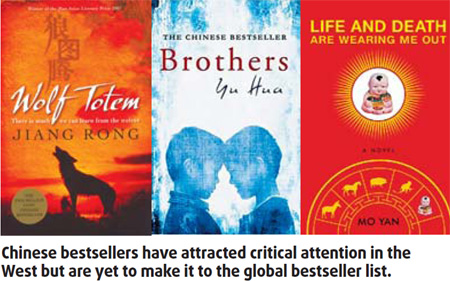
The hunt for China's Haruki Murakami is on. Publishers - both Chinese and the global big players - are waiting for the next blockbuster novelist to emerge out of China who will sell millions of copies across the world in translation.
Jiang Rong's Wolf Totem (Lang Tuteng), Yu Hua's Brothers (Xiong Di), Mo Yan's Life and Death are Wearing Me Out (Shengsi Pilao) - all of which attracted widespread critical attention in the Western media, and big-time international literary awards - are yet to make it to the global bestseller list.
So what would it take for Chinese literature to make the big splash in the world market?
Professor Paul Richardson, chair of the Board of China Publishing Ltd, UK, has a four-pronged strategy to overcome the hurdles - "develop strong competitive advantages in terms of content and presentation, improve the quality and availability of translators, use Western editors as intermediaries between Chinese content and Western readers and be better informed about the ways of the Western market".
The key, says Richardson, is to ask: "What have I got that the Western market would like to buy?"
A culture as historically rich, ethnically diverse, politically significant and economically self-assured as China has, in fact, loads to offer the world. It's just a question of packaging and pitching it right.
The need of the hour, says Stephen Bourne, CEO, Cambridge University Press, is "to organize promotional events around all books coming out of China, to make a concerted effort so that people start getting interested in China as a subject".
Three major international book events lined up almost back-to-back would be a good opportunity for Chinese writers, publishers and content developers to showcase what's in their kitty. The spotlight on Chinese books at the Beijing International Book Fair will extend to the Frankfurt Book Fair early in October and the London Book Fair in April 2012.
"China being the Guest of Honor in Frankfurt this year, and as the market focus in London 2012, means an opportunity to promote the broad reach of Chinese culture to a new audience," says Jo Lusby, general manager, Penguin Books, China. "We are already working on projects with a view to them maturing in 2012, in time to promote a new generation of Chinese authors to readers in the UK."
To turn these authors, yet undiscovered by the West, into recognizable and saleable brands, the mediation of a good translator, "a native English speaker" as Stephen Bourne prefers to put it, is essential.
And Howard Goldblatt, a professor of modern Chinese literature and culture, who has translated 40 novels and story collections by writers from the Chinese mainland, Taiwan and Hong Kong, and published with both Penguin and HarperCollins, is easily the most sought-after among them, bringing to his work "an accurate translation of Chinese culture and values," according to Brian Murray, CEO, HarperCollins Worldwide.
Lusby adds UK-based academic Julia Lovell's name to the distinguished translators' club. Lovell, whose translation of the collected short fiction of Lu Xun is due out in October, "is poised to take over Goldblatt's mantel in the future, and brings a wry sense of humor to her translations that is entirely fitting with the tone and style of Chinese literature", observes Lusby.
The good thing about the Chinese government's initiative to promote Chinese books overseas, says Stephen Bourne, "is that they are trying to get people who can support the endeavor rather than telling them what to do".
In keeping with the demands of the jet age, these consultants serving on the advisory board of China Book International (CBI), such as Bourne himself, are urging Chinese publishers to pull out all the stops, get their act together, make use of the modern merchandizing devices, such as e-books and Kindle, and launch intensive campaigns, informing the world about the wealth of books China keeps producing.
As Murray, who was inducted into CBI's foreign consultants' panel, puts it, "We need to find ways to make people talk about Chinese culture in the West".
He and his fellow foreign consultants to the CBI are not sparing any effort.
(China Daily September 8, 2009)